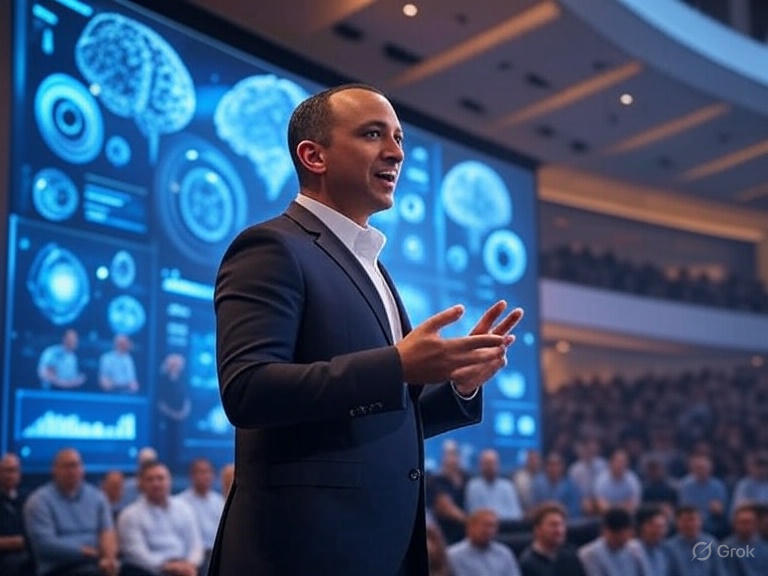In today’s rapidly evolving technological landscape, artificial intelligence has become one of the most transformative forces shaping our future. From revolutionizing business operations to changing how we interact with technology, AI’s impact is undeniable. As organizations worldwide seek to understand and leverage these advancements, the demand for expert artificial intelligence keynote speakers has skyrocketed. This comprehensive guide will explore everything you need to know about hiring an AI keynote speaker who can deliver cutting-edge insights and inspire your audience.
Understanding the Role of an Artificial Intelligence Keynote Speaker
An artificial intelligence keynote speaker serves as more than just an educator—they are visionaries who translate complex technological concepts into actionable insights for diverse audiences. According to Wikipedia’s definition of keynote speakers, these professionals set the underlying tone and summarize the core message of an event, making them crucial for AI-focused conferences, corporate events, and educational seminars.
The best AI keynote speakers combine deep technical expertise with exceptional communication skills, enabling them to bridge the gap between complex algorithms and practical business applications. They help audiences understand not just what AI can do today, but what it might accomplish tomorrow and how organizations can prepare for this technological revolution.
What Makes an Effective AI Keynote Speaker?
Effective artificial intelligence keynote speakers possess several key characteristics:
Technical Expertise: They have hands-on experience working with AI technologies, machine learning algorithms, and emerging innovations in the field. Many have backgrounds in computer science, data science, or have led AI initiatives at major technology companies.
Communication Excellence: The ability to translate technical jargon into accessible language is crucial. Great AI speakers use analogies, real-world examples, and storytelling techniques to make complex concepts understandable to any audience.
Industry Insight: Top speakers understand AI’s implications across various sectors—from healthcare and finance to manufacturing and entertainment. They can speak to specific industry challenges and opportunities.
Future-Focused Vision: The most valuable AI keynote speakers don’t just discuss current capabilities but offer thoughtful predictions about AI’s trajectory and its potential societal impact.
Types of AI Topics That Keynote Speakers Address

AI in Business Transformation
Modern artificial intelligence keynote speakers frequently focus on how AI is revolutionizing business operations. Forbes regularly reports on AI’s business applications, highlighting success stories and transformation strategies. Speakers in this category discuss:
- Automation and Efficiency: How AI streamlines processes, reduces costs, and improves productivity
- Customer Experience Enhancement: Using AI for personalization, chatbots, and predictive customer service
- Data-Driven Decision Making: Leveraging machine learning for business intelligence and strategic planning
- Competitive Advantage: How early AI adoption creates market differentiation
Just as smart cities are implementing innovative solutions for urban challenges, as demonstrated in Istanbul’s blueprint for sustainable cities, businesses are finding creative ways to integrate AI into their core operations for sustainable growth and efficiency.
The Future of Work and AI
One of the most compelling topics for AI keynote speakers is the changing nature of work in an AI-powered world. These presentations typically explore:
- Job Evolution vs. Job Displacement: Addressing concerns about AI replacing human workers while highlighting new opportunities
- Upskilling and Reskilling: Strategies for workforce adaptation in an AI-integrated environment
- Human-AI Collaboration: How humans and machines can work together more effectively
- Remote Work and AI: The role of AI in enabling and enhancing distributed work models
AI Ethics and Governance
As AI becomes more prevalent, ethical considerations have moved to the forefront of public discourse. Keynote speakers addressing these topics often reference academic sources and policy discussions, including those found on platforms like Stanford’s AI Ethics resources, to discuss:
- Bias and Fairness: Ensuring AI systems treat all users equitably
- Privacy and Data Protection: Balancing AI capabilities with individual privacy rights
- Transparency and Explainability: Making AI decision-making processes understandable
- Regulatory Compliance: Navigating emerging AI governance frameworks globally
Innovation and Emerging Technologies

Forward-thinking AI keynote speakers often focus on cutting-edge developments and their potential applications:
- Generative AI and Large Language Models: The revolution in content creation and human-computer interaction
- Computer Vision and Autonomous Systems: From self-driving cars to advanced robotics
- Natural Language Processing: Breaking down language barriers and enabling more intuitive interfaces
- AI in Scientific Research: Accelerating discovery in medicine, materials science, and beyond
How to Select the Right Artificial Intelligence Keynote Speaker
Assessing Speaker Credentials and Experience
When evaluating potential AI keynote speakers, consider their professional background and achievements:
Academic Credentials: Look for speakers with advanced degrees in relevant fields or affiliations with prestigious research institutions.
Industry Experience: Speakers who have worked at major technology companies or have founded AI startups bring practical insights that resonate with business audiences.
Publication Record: Authors of influential AI research papers or popular books on artificial intelligence demonstrate thought leadership in the field.
Speaking Experience: Review their previous speaking engagements, audience feedback, and ability to engage diverse groups effectively.
Matching Speaker Expertise to Your Audience
Different audiences require different approaches:
Technical Audiences: Software developers, data scientists, and IT professionals benefit from speakers who can dive deep into technical details and implementation strategies.
Business Leaders: Executives and managers need speakers who focus on strategic implications, ROI considerations, and competitive advantages of AI adoption.
General Public: Educational institutions and community organizations benefit from speakers who can make AI accessible and relevant to everyday life.
Industry-Specific Groups: Healthcare professionals, financial services teams, or manufacturing leaders need speakers with relevant sector experience.
Geographic and Format Considerations
Modern artificial intelligence keynote speakers offer various engagement formats:
In-Person Presentations: Traditional keynote format with maximum audience engagement and networking opportunities.
Virtual Keynotes: Cost-effective option that enables global reach and can include interactive elements like live Q&A sessions.
Hybrid Events: Combining in-person and virtual attendance to maximize audience reach while maintaining engagement quality.
Workshop Format: Extended sessions that combine keynote insights with hands-on learning experiences.
The Business Case for AI Keynote Speakers

Return on Investment for AI-Focused Events
Organizations investing in artificial intelligence keynote speakers typically see returns through:
Knowledge Transfer: Employees gain insights that directly impact their work performance and decision-making capabilities.
Innovation Catalyst: Exposure to cutting-edge AI concepts often sparks internal innovation initiatives and creative problem-solving.
Competitive Intelligence: Understanding AI trends helps organizations stay ahead of competitors and identify new market opportunities.
Change Management: AI speakers help ease organizational transitions by explaining the benefits and addressing concerns about technological change.
Industry Transformation Case Studies
Successful AI keynote presentations often include real-world examples of transformation:
Healthcare Revolution: AI applications in diagnostic imaging, drug discovery, and personalized treatment plans have revolutionized medical practice.
Financial Services Innovation: From fraud detection to algorithmic trading, AI has transformed how financial institutions operate and serve customers.
Manufacturing Excellence: Predictive maintenance, quality control, and supply chain optimization demonstrate AI’s industrial applications.
Retail Personalization: AI-driven recommendation systems and inventory management have redefined customer experience and operational efficiency.
Booking and Budget Considerations
Fee Ranges and Pricing Factors
Artificial intelligence keynote speaker fees vary significantly based on several factors:
Speaker Reputation and Demand: Renowned AI researchers or industry leaders command premium fees, often ranging from $25,000 to $100,000+ for major events.
Event Size and Scope: Large conferences with thousands of attendees typically pay more than intimate corporate gatherings.
Travel Requirements: International speakers may require additional travel, accommodation, and logistics costs.
Customization Level: Highly customized presentations tailored to specific industries or challenges may command higher fees.
Format and Duration: Half-day workshops or multi-session engagements cost more than standard 45-60 minute keynotes.
Planning and Logistics
Successful AI keynote events require careful planning:
Lead Time: Popular speakers book months in advance, especially during peak conference seasons.
Technical Requirements: AI presentations often include multimedia elements, live demonstrations, or interactive components requiring specific AV setups.
Content Coordination: Work with speakers to align their message with your event themes and organizational objectives.
Promotion Strategy: Leverage the speaker’s expertise and reputation in your marketing materials to maximize attendance and engagement.
Emerging Trends in AI Speaking
Integration with Other Technologies
Modern AI keynote speakers increasingly discuss AI’s intersection with other emerging technologies:
Internet of Things (IoT): How AI processes and acts on data from connected devices to create smarter environments.
Blockchain and AI: The convergence of decentralized technologies with artificial intelligence for enhanced security and transparency.
Quantum Computing: The potential for quantum computers to accelerate AI processing and enable new applications.
Extended Reality (AR/VR): AI’s role in creating more immersive and intelligent virtual experiences.
Just as innovative tools are being developed for various applications—including specialized resources like bible verse generators that use AI to help users find relevant spiritual content—the integration of AI across different domains continues to expand, creating new opportunities for speakers to address diverse audience interests.
Addressing Current Challenges and Opportunities
Today’s artificial intelligence keynote speakers must address pressing contemporary issues:
AI Safety and Alignment: Ensuring AI systems behave in ways that align with human values and intentions.
Environmental Impact: Discussing the energy consumption of AI systems and sustainable computing practices.
Global AI Governance: Navigating international differences in AI regulation and ethical standards.
Democratization of AI: Making AI tools and knowledge accessible to smaller organizations and developing countries.
Maximizing Value from Your AI Keynote Speaker
Pre-Event Preparation
To maximize the impact of your artificial intelligence keynote speaker:
Audience Survey: Understand your attendees’ current AI knowledge level and specific interests.
Organizational Context: Provide speakers with background about your industry, challenges, and strategic objectives.
Interactive Elements: Discuss opportunities for Q&A sessions, workshops, or follow-up conversations.
Content Alignment: Ensure the speaker’s message complements other event programming and organizational messaging.
Post-Event Follow-Up
Extend the value of your AI keynote investment:
Resource Sharing: Many speakers provide additional materials, research papers, or tool recommendations.
Internal Discussion: Organize follow-up sessions to discuss key insights and potential applications.
Action Planning: Develop specific initiatives based on the speaker’s recommendations and insights.
Relationship Building: Maintain connections with speakers for future consulting opportunities or ongoing dialogue.
The Future of AI Keynote Speaking
Evolution of Speaker Formats and Delivery
The artificial intelligence keynote speaking industry continues to evolve:
AI-Enhanced Presentations: Some speakers now use AI tools to create more dynamic, personalized presentation experiences.
Real-Time Interaction: Advanced polling, sentiment analysis, and audience response systems create more engaging experiences.
Immersive Experiences: Virtual and augmented reality elements bring AI concepts to life in new ways.
Global Accessibility: Translation technologies and virtual formats make top AI speakers accessible to worldwide audiences.
Emerging Speaker Profiles
The next generation of AI keynote speakers includes:
AI Ethics Specialists: As governance becomes more important, speakers focusing specifically on ethical AI development gain prominence.
Industry-Specific Experts: Professionals who understand both AI technology and specific sector challenges become increasingly valuable.
Human-AI Collaboration Experts: Speakers who focus on optimizing human-machine partnerships address growing workplace concerns.
Global Perspective Speakers: Professionals who understand AI development and deployment across different cultures and regulatory environments.
Conclusion: Investing in AI Knowledge Leadership
Hiring an artificial intelligence keynote speaker represents more than just filling a program slot—it’s an investment in your organization’s future readiness and competitive positioning. As AI continues to reshape industries and society, the insights provided by expert speakers become increasingly valuable for strategic planning, workforce development, and innovation initiatives.
The most successful organizations recognize that AI literacy isn’t optional in today’s business environment. By bringing in keynote speakers who can translate complex technological concepts into actionable strategies, companies can accelerate their AI journey while ensuring their teams understand both the opportunities and responsibilities that come with these powerful technologies.
Whether you’re planning a corporate retreat, industry conference, or educational event, the right artificial intelligence keynote speaker can provide the catalyst for meaningful transformation. Take time to carefully evaluate potential speakers, align their expertise with your audience’s needs, and create an environment where their insights can drive real organizational change.
As we move further into the AI-powered future, the organizations that invest in understanding and preparing for these changes will be the ones that thrive. An expert AI keynote speaker can be your guide on this exciting journey toward technological transformation and competitive advantage.
The investment in AI knowledge leadership through expert keynote speakers pays dividends in organizational preparedness, employee engagement, and strategic positioning. Choose wisely, plan carefully, and prepare to be inspired by the incredible possibilities that artificial intelligence brings to your industry and organization.





Pingback: Who is the Father of AI? Unveiling the Pioneers Behind Artificial Intelligence - Snapspeak